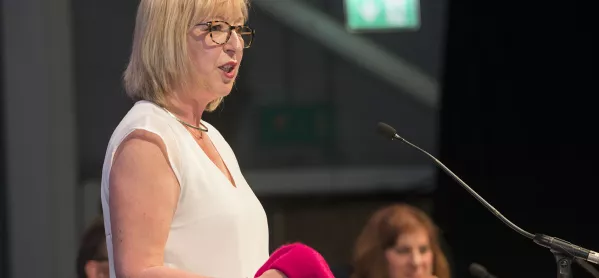Another pay claim, reducing class-contact time and boosting additional support needs (ASN) funding are top priorities for the EIS union in the year ahead, general secretary Andrea Bradley has said.
Ms Bradley, in her first EIS annual general meeting in the role, said this lunchtime that the energy of the recent successful teacher pay campaign will have to be drawn on again.
“We’ve trained and flexed and firmed our trade union muscle, for most of us like never before: we have more members than ever before, more reps in our schools than ever before, more activists than ever before,” she said.
Ms Bradley, who last year became the first female EIS general secretary in the 175 years since the union was formed, added: “Six months from now, we’ll be submitting our next pay claim. From now until then we’ll be keeping an eye on the lie of the land, building our narrative, strengthening the alliances that we’ve already built and looking to build new ones.”
She also trailed “a new national campaign for proper funding for education as a vital and valuable public service”.
She said: “We’ll be using every ounce of that very well-toned campaigning muscle as we pivot to tackle the scandalous underfunding of ASN, your crippling workload, the boundless bureaucracy that swallows up your time, and the health and safety risks that are intensifying daily amidst large class sizes and lack of additional support, including for mental health, in the aftermath of the pandemic and a decade of austerity before that.”
Cutting teachers’ class-contact time
On the Scottish government’s promise to reduce teachers’ class-contact time, Ms Bradley called for “no more dither, no more delay”, adding: “We need solid action to reduce workload as promised, and we need it now. And our new campaign will be going after that.”
Smaller class sizes are still “in our 20:20 sights” despite the government long since having gone cold on that policy, said Ms Bradley, highlighting concerns about teacher numbers falling overall for the first time in five years.
“The recent Scottish government commitment to protect teacher numbers is absolutely essential and they need to stick to it,” she said.
Tackling violence in classrooms
Meanwhile, Ms Bradley also told the EIS AGM that more action must be taken to tackle violence in classrooms, which has been a source of much debate in recent months.
“Violent incidents and distressed behaviour are the consequence of not listening to the voices of teachers calling for more support for children and young people whose mental health is fragile, and [we are] calling for more support for the teachers and other school staff who work with those young people and whose wellbeing continues to take a battering as schools struggle with Covid recovery,” she said.
The comments come after the Scottish government announced last month that it would host “a summit focused on tackling violence in schools” - although education secretary Jenny Gilruth described it in Parliament yesterday as a “summit on relationships and behaviour”.
The plan is for the summit to take place sometime after the school summer holidays.
Finally, on education reform, Ms Bradley made it clear that the EIS will not accept minor changes to the Scottish Qualifications Authority.
“What we don’t want or need either is the same old SQA simply rebranded,” she said. “Teachers will see right through that and will be raging if years of education reform and hundreds of promises come to nothing.”
As she wrapped up, Ms Bradley cited an EIS survey which suggested that only around half of teachers plan to stay in the profession for the next five years.
“All of this should scream out that education needs greater priority within government - and our new campaign will be focused on just that,” she said.




